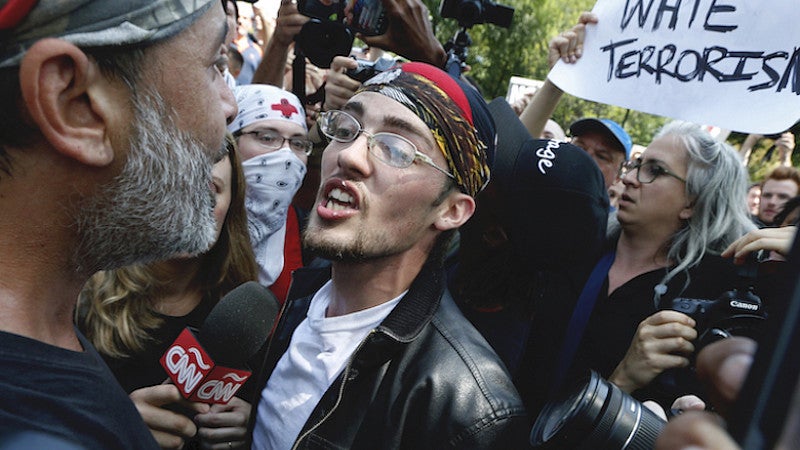
For reporters and photographers, white nationalism is one of the most dangerous beats in the country. It’s also one of the most important.
Yet the journalists asked to cover the issue say they feel siloed, ill-prepared and uninformed about the continuously mutating movement they’ve been tasked with understanding and explaining. Many feel disconnected from the support and resources they need to do their job well. Their editors and co-workers, who tend to be focused on more mainstream issues, don’t understand the intricacies of their work. And deep research into the bowels of white nationalist belief and rhetoric can leave journalists feeling personally attacked and demoralized.
To help journalists overcome those obstacles, the School of Journalism and Communication’s Agora Journalism Center partnered with the Western States Center to host a daylong work session and discussion in the fall at UO Portland on the White Stag Block. The Western States Center is a nationwide nonprofit, based in Portland, that works to strengthen inclusive democracy as well as social, racial and economic justice. The Agora Journalism Center’s mission is to advance media innovations that enhance inclusive civic engagement.
The goal of the event, titled “Communicating about White Nationalism,” was to share best practices, build networks and reach understanding about the extent of the white nationalism movement and its roots in American history.
More than 50 reporters, photographers, editors and academics attended the event on Oct. 29, including freelance reporters and photographers, staff writers for newspapers and online outlets, as well as academics and nonprofit directors. They participated in panel discussions, broke into small groups to tackle specific problems and identified best practices.
Regina Lawrence, associate dean of the School of Journalism and Communication’s Portland campus and director of the Agora Journalism Center, said the university convened the event with the hope of identifying best practices for covering racial extremists.
“White nationalism is a complex movement to explain to the public, and it shows no signs of going away anytime soon,” she said. “It’s critical that journalists find ways to cover this movement more thoughtfully, to include the voices of people directly impacted by it.”
It’s a dilemma that journalists have long puzzled over: How do you meet the public’s need to know without disseminating hate speech to a wider audience? Attendees learned how to recognize when they are being manipulated by hate groups and how to cover chaotic events with the balance and context the profession demands.
The event marked the beginning of an ongoing collaboration. Lawrence said the Agora Journalism Center will continue to work with Western States Center to help identify best practices for covering white nationalism, create communities for journalists to share information and support one another, and perhaps host additional conferences and gatherings in the future.
—By Tim Trainor, Multimedia Journalism Master’s Student, School of Journalism and Communication
Know of a journalist or news organization that faced an ethical dilemma while publishing a story in 2019? Nominate them by Feb. 15 for the SOJC's 2020 Ancil Payne Award for Ethics in Journalism. This year’s 20th anniversary winner will receive a $10,000 prize.
